The Disenchantment Of The Rhine (And Europe)
The symbolism of the Rhine and its disenchantment.
There’s a scene in the corny and bloated 1963 film ‘‘Cleopatra’’ wherein Augustus Caesar is nonchalantly informed by a Roman functionary that his great enemy, Mark Anthony, is now dead. Caesar sarcastically quips:
‘‘Oh..so that’s how one says it….Mark Anthony is dead, he’s alive, he’s dead. The soup is hot, the soup is cold’’
Caesar then explodes into a tirade on how lower men should speak such words with awe and tremble at the very thought of a titan of a man such as Mark Anthony being no more.
In Shakespeare’s play Caesar puts it thus:
The breaking of so great a thing should make a greater crack.
The round world
Should have shook lions into civil streets
And citizens to their dens. The death of Antony
Is not a single doom. In the name lay
A moiety of the world.
Anthony’s death was an epochal event which should be spoken of with gravity and an eye on its historical significance, not announced as a man would describe the weather.
I’ve been reminded of Augustus Caesar’s sentiments this week while reading news reports that the river Rhine is coming very close to running dry. I do not intend to wade too deeply into the quagmire of climate change science, however, whether man-made or not, it would indeed appear that one of the great rivers of Europe has been steadily dwindling for years.
The so-called ‘‘Hunger stones’’ which are only revealed at exceptionally low water marks are appearing with increasing regularity, including the ominous ‘‘Wenn du mich siehst, dann weine’’ or ‘‘when you see me, then cry’’ because a drought or famine is imminent.
However, what struck me about the reporting and general attitude toward the Rhine that we see today was the sterility of the strictly utilitarian and mechanistic mindset of the current era. The Rhine running dry is a problem because Germany relies on it for transporting goods and material. It’s also possible that Germany’s already chronic energy troubles will be exacerbated still further by the Rhine being reduced to a mere trickle of its former self.
Yet this, along with the usual sermons about climate change, are about as far as we can go. The Rhine of a thousand paintings and Wagner’s Rhine-maidens, of Germany’s primal frontier — warred over for millennia — is just a convenient body of water upon which industry can transport cement and salt.
A hack journalist or a bureaucrat will casually inform us that The Rhine is drying up in the same indifferent tones that Dercetas informs Caesar that Mark Anthony is dead.
If the snow disappears from the Swiss Alps and tributaries feeding the Rhine give-out then a prominent feature of European spiritual, mythological and historical identity will cease to exist. However, the prime concern is that material goods will have to be rerouted via rail or motorway.
Instrumental reason allied to modern capitalism have, in effect, launched a pincer movement on the river Rhine and European understandings of their world. The Rhine is significant only in the form of what Heidegger called a ‘‘standing reserve’’ of energy. The sight of the Rhine itself, being reduced to a mere stream or a trickle in a summer heatwave, reveals the Rhine to be a slave of capital in the sense that its only value is as a means by which goods and material can be moved efficiently, when the Rhine shrinks that efficiency is disrupted and thus becomes a problem within the value-set of late-modernity.
Why is it that seeing photos of the Rhine’s exposed mud-banks and riverbed make us feel gloomy? was your immediate thought something like:
‘‘Oh no this is going to be a real headache for the petro-chemical industry’’?
It could be argued that we are instinctively driven to feel pessimistic at images depicting a scarcity of water — which would bring us closer to the truth. However, I would argue that the real reason we do not feel comfortable with such pictures is because we’re seeing something we feel we should not be seeing — we are seeing the secrets, or lack thereof, of something which is symbolically more than ‘‘just a river’’.
There are no Rhine-maidens defending pots of gold and Lorelei is not bedazzling fishermen with her siren’s song. There’s tires and shopping trolleys, mud and rusting pipes.
The Rhine, then, has become ‘‘disenchanted’’ as Max Weber describes it:
The increasing intellectualisation and rationalisation do not, therefore, indicate an increased and general knowledge of the conditions under which one lives.
It means something else, namely, the knowledge or belief that, if one but wishes, one could learn it at any time. Hence, it means that principally there are no mysterious incalculable forces that come into play, but rather that one can, in principle, master all things by calculation. This means that the world is disenchanted. One need no longer have recourse to magical means in order to master or implore the spirits, as did the savage, for whom such mysterious powers existed. Technical means and calculations perform the service. This above all is what intellectualisation means.
The modern materialist would of course scoff at such reactionary musings, after all, the goods being transported up and down the Rhine actually serve to improve the lives of people, not just in Germany, but all across Europe and perhaps the world. From the this perspective, the one which dominates today, attaching higher symbolic value to geographic forms is most certainly dated and perhaps even a little childish.
However, if one does have a more poetic, symbolic view of the world, then we rapidly come into contact with a word which seems alien to modern materialists, and that word is ‘‘Meaning’’.
What does the prospect of the river Rhine drying-up actually mean? to my mind it symbolizes the end of Germany, German people and German culture with the rest of Europe following shortly after. It is a cataclysmic event which would have dumbfounded and terrified Europeans of an earlier age, all of whom would have understood the profound existential and spiritual ramifications of Europe without one of its major rivers. Hindus would most certainly view the dwindling of the Ganges as some form of apocalypse, and rightly so from their perspective. Europeans, however, exist within a disenchanted world where nothing is sacred.
The Industrial Revolution marked the first major severing of Europeans from their land in a mythological and spiritual sense. Here once again capital and rationalism allied to reduce the sacred to quantity and energy, the mythological to whimsy and the magical to calculation. Every mile of wiring and every coal-powered engine squeezed out a little of the divine and ushered in a little more of the profane.
The Romanticism of the 1800’s, both musically and in the realm of painting, was an attempt to re-enchant or protect the sense of sacredness of European soil and spirit. The Rhine played no minor role as a source of inspiration, perhaps most famously with Wagner’s Ring Cycle we see the mythologizing of the great river. Wagner’s Ring Cycle was itself drawing from earlier Germanic legend and the Nibelungenlied.
Personally I believe the Romanticist influence on Tolkien is much under appreciated, but nevertheless, the Rhine as depicted in Romantic paintings conjures an other-worldly timelessness. The constructs of man can often been seen in ruins along its banks or overlooking the meandering, snakelike flow of water dominating the landscape.
Such mythopoetic forms naturally induce a feeling of kinship and volk by way of creating meaning and narratives in which the individual can make sense of their world and their place in it. This, then, allows for a sense of home, or homeland. Value is not reduced to financial exchange but contingent upon Being and identity. It is, in short, the opposite of what we have today.
We exchanged meaning and identity for technological progress and material wealth, identity was to be grounded within consumer products and employment. And yet if the climate change alarmists are correct then what, in the end, have we gained from it all? This is why I find the symbolism of the Rhine being reduced to a trickle so powerful. The great river was first tamed then turned into a standing reserve of energy, then enslaved and reduced to a network hub for industry. After which those same processes of industry ruined the climate, and melted the river’s water source, making it increasingly difficult for goods to be transported at all.
It is bitterly ironic that the same people who endorsed — enforced — the consumerist model are now screaming loudest about the dire state of the world’s climate because of their own greed and hubris.
If they are to be believed then they’ve taken one of the world’s most mythical and inspiring geographical gifts and reduced it to a dry and barren patch of rock.
How apt indeed for the hunger stones to carry a message of ‘‘When you see me, then cry’’.





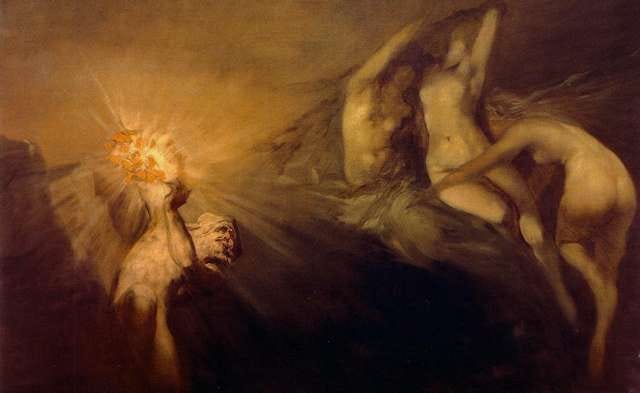
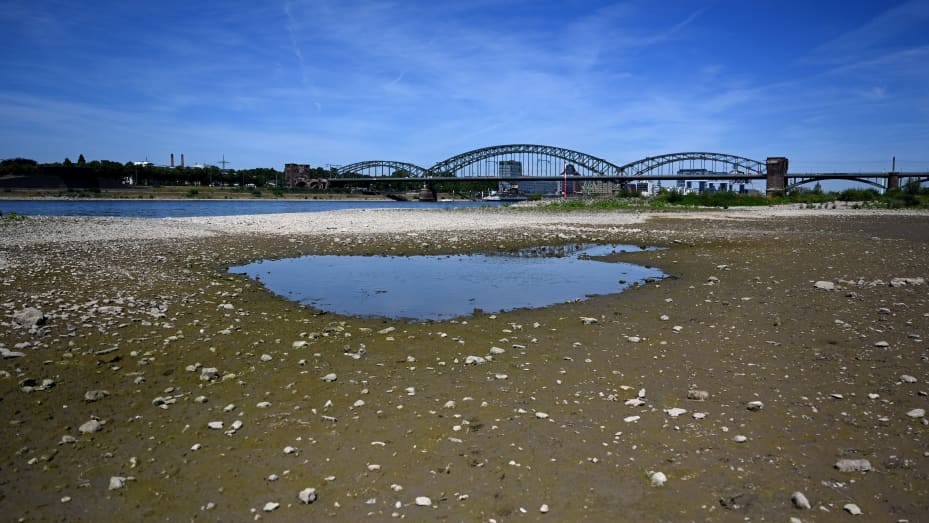
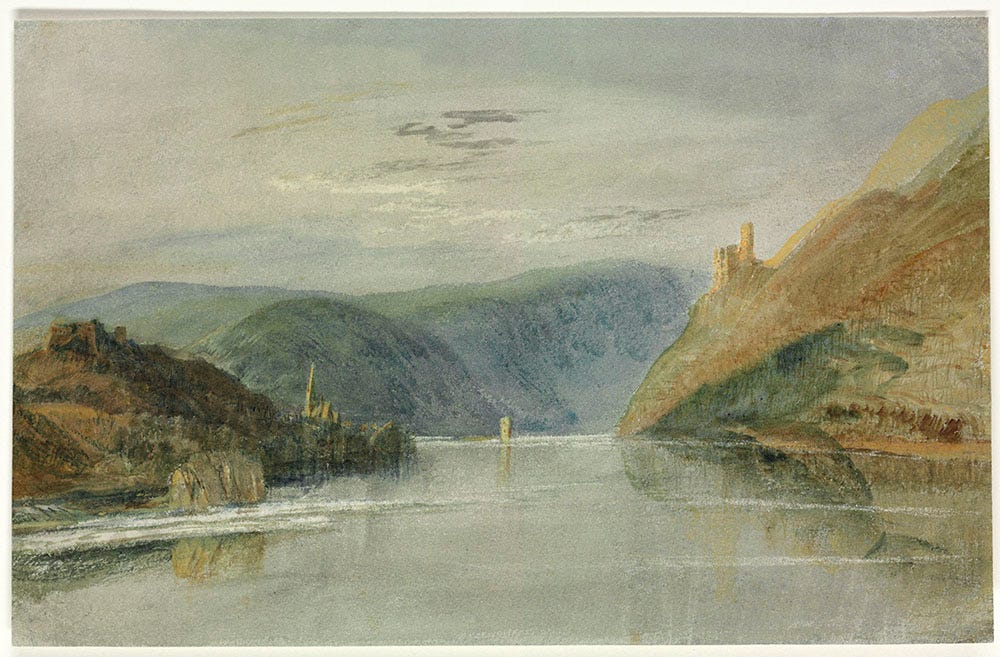
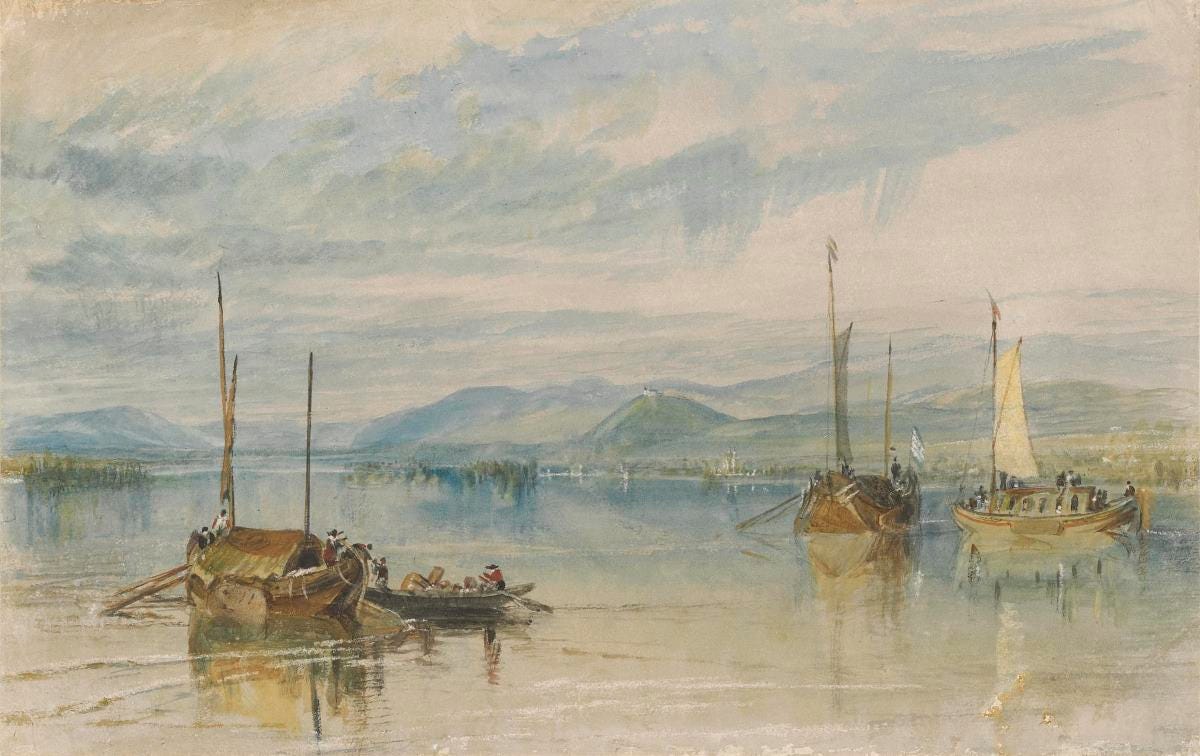
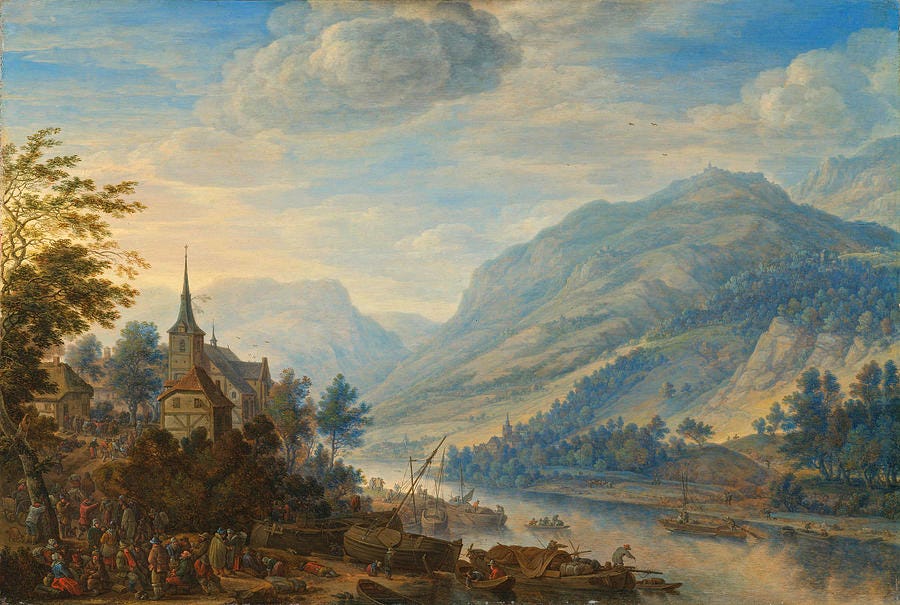
In the early 80s when I was a kid, we lived about 5 minutes from a really pretty stretch of the Thames, and I used to visit it all the time for years. I have said before that I think in those years the river became part of me. I still feel a deep connection to it, a feeling of home and peace. It is not merely symbolic to say that spirits live in rivers, lakes, mountains and woods. There is a deep truth in it. Respect for these places is yet another traditional form of knowledge that we have forgotten, and those spirits are going to show us their anger at our hubris, if they are not already doing so.
This is an absolutely beautiful and tragic piece of work. One of your best writs.